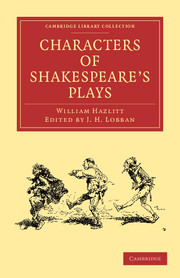Book contents
- Frontmatter
- Preface
- Contents
- Introduction
- Preface
- Cymbeline
- Macbeth
- Julius Cæsar
- Othello
- Timon of Athens
- Coriolanus
- Troilus and Cressida
- Antony and Cleopatra
- Hamlet
- The Tempest
- The Midsummer Night's Dream
- Romeo and Juliet
- Lear
- Richard II
- Henry IV
- Henry V
- Henry VI
- Richard III
- Henry VIII
- King John
- Twelfth Night; or, what you will
- The Two Gentlemen of Verona
- The Merchant of Venice
- The Winter's Tale
- All's Well That Ends Well
- Love's Labour's Lost
- Much Ado About Nothing
- As You Like It
- The Taming of the Shrew
- Measure for Measure
- The Merry Wives of Windsor
- The Comedy of Errors
- Doubtful plays of Shakespear
- Poems and Sonnets
- Notes
The Two Gentlemen of Verona
Published online by Cambridge University Press: 07 September 2010
- Frontmatter
- Preface
- Contents
- Introduction
- Preface
- Cymbeline
- Macbeth
- Julius Cæsar
- Othello
- Timon of Athens
- Coriolanus
- Troilus and Cressida
- Antony and Cleopatra
- Hamlet
- The Tempest
- The Midsummer Night's Dream
- Romeo and Juliet
- Lear
- Richard II
- Henry IV
- Henry V
- Henry VI
- Richard III
- Henry VIII
- King John
- Twelfth Night; or, what you will
- The Two Gentlemen of Verona
- The Merchant of Venice
- The Winter's Tale
- All's Well That Ends Well
- Love's Labour's Lost
- Much Ado About Nothing
- As You Like It
- The Taming of the Shrew
- Measure for Measure
- The Merry Wives of Windsor
- The Comedy of Errors
- Doubtful plays of Shakespear
- Poems and Sonnets
- Notes
Summary
This is little more than the first outlines of a comedy loosely sketched in. It is the story of a novel dramatised with very little labour or pretension; yet there are passages of high poetical spirit, and of inimitable quaintness of humour, which are undoubtedly Shakespear's, and there is throughout the conduct of the fable a careless grace and felicity which marks it for his. One of the editors (we believe Mr Pope) remarks in a marginal note to the Two Gentlemen of Verona—
“It is observable (I know not for what cause) that the style of this comedy is less figurative, and more natural and unaffected than the greater part of this author's, though supposed to be one of the first he wrote.”
Yet so little does the editor appear to have made up his mind upon this subject, that we find the following note to the very next (the second) scene.
“This whole scene, like many others in these plays (some of which I believe were written by Shakespear, and others interpolated by the players) is composed of the lowest and most trifling conceits, to be accounted for only by the gross taste of the age he lived in: Populo ut placerent. I wish I had authority to leave them out, but I have done all I could, set a mark of reprobation upon them, throughout this edition.”
- Type
- Chapter
- Information
- Characters of Shakespeare's Plays , pp. 199 - 201Publisher: Cambridge University PressPrint publication year: 2009First published in: 1908

